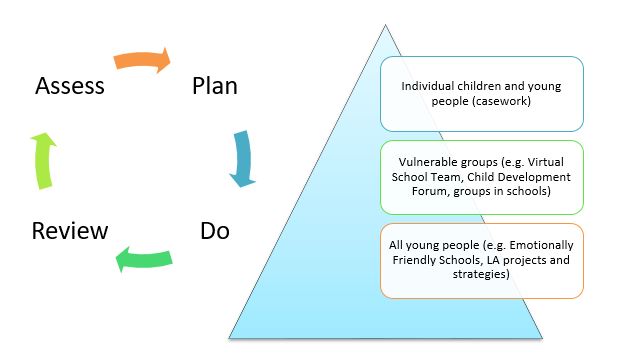Educational Psychology Service
Position Statement on the Right to Play
What We Do
At Tameside Educational Psychology Service we put children and young people at the heart of our service. We work with children and young people between the ages of 0 - 25 years of age. We are a relatively new service that was co-produced in 2019 with help from children and young people across Tameside and supported by Salford Educational Psychology Service.
Many children have needs within their development and learning at some point in their lives. Most improve with the help of their families, their schools and their friends. The Educational Psychology Service can offer additional advice and support when this may be needed.
The diagram below shows how we meet the needs and support the wellbeing of all children and young people across Tameside. We work through a process of assess, plan, do and review. We also work on different levels, including supporting with individual children and young people (casework), with vulnerable groups, such as supporting Cared for Children, and by providing projects, training, workshops and strategic work.
Further information about how the EPS support children and young people in Tameside is explained in the Tameside educational psychology leaflet and in the handout How educational psychologists support children and young people with SEND.
SEND Children Thrive – Matching provision to need
This resource was developed by the Educational Psychology Service in consultation with schools, settings and services across Tameside. The documents aim to provide a tool to support excellent practice across Special Educational Needs and Disability (SEND) provision in educational settings and promote positive outcomes for children and young people identified as having additional needs. This tool is reflective of the LA’s graduated response to SEND and embodies 2014 reforms, as it is collaborative, puts children and families at the centre, is transparent and it has a focus on outcomes.
We aspired to develop a resource that raised the standards of education and support for SEND children/young people through the sharing of best practice and known evidence-based interventions. The Special Educational Needs and Disability Co-ordinators (SENDCos) of the local area have contributed with the ways of working that are effective in their schools and settings (practice-based evidence).
It is our hope that through this collaborative work, SENDCos will be empowered to advocate for SEND children from classroom practice to points of provision and to help the wider workforce understand that support needs to be targeted, evidence-based and focused. Together we can ensure that SEND children THRIVE!
These files may not be suitable for users of assistive technology. Request an accessible format
The links and attachments within this document do not work in Google Chrome – it does however work in all over browsers such as Internet Explorer. If you only have access to Google Chrome, please save the document and then open it through Adobe Reader, as this will support full access to the document. If you have any further queries or questions please contact us on EPS@tameside.gov.uk
A leaflet explaining the SEND Children Thrive Resource for parents and carers
This leaflet was made by parents/carers for parents/carers
SEND Children Thrive – Evaluation
Please let us know your experiences of using the SEND Children Thrive document using this short survey: SEND Children Thrive - Evaluation - Google Forms. We will use this feedback to review and make amendments on an annual basis.
Dyslexia identification pathway
This document outlines Tameside’s dyslexia identification pathway.
The aim of this document is to promote a shared rationale and understanding in the identification, assessment and support for pupils with dyslexia within the local authority.
Emotionally Based School Avoidance (EBSA)
The aim of this document is to promote best practice in supporting children, young people and their families who are affected by difficulties with attending school due to emotional factors, including anxiety. It can be used by school staff and other professionals.
Emotionally Based School Avoidance - Good practice guidance for Tameside schools and support agencies
Contact information
Tameside MBC
Discovery Academy
Porlock Avenue
Hattersley
Hyde
SK14 3LE











